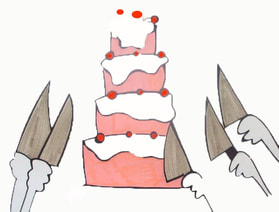 There is a new scam going the rounds, tempting authors into giving away the rights to their books for free – and it is entirely legal. This affects EU copyright law, but globally the laws are very similar so you may want to keep reading and then check the law where you live. Particularly the law as it applies in the country where the scammer lives, not where you live, because that is where you will have to pursue your claim for copyright infringement. The scam relates to the copyright laws for the translations of books. It was meant to protect translators and give them some ownership of what they had worked hard to produce. But with recent advances in AI the law has not been able to keep up and this has opened up a loophole for scammers to wriggle through. I want to reassure you that not all translators are scammers. The vast majority are honest people and will deal with you honestly. But, as usual, a small minority give the rest a bad name. So, how does this scam work?  You get an email or a DM asking if a “student” can translate your book as part of their university work. Or it may be that someone is offering to do a translation of your book for free for you for “practice”. Being a kind person, you agree that the student can do the translation. However, it is the translator who owns the copyright of the translation, not the author and this is the loophole that the scammers exploit.* They can upload the translated version of the book onto Amazon and sell it legally and there is nothing the author can do about it, because the author gave permission for the person to translate their book – and the scammer will have the email or DM to prove it.  It may not even be a decent translation, but the book’s buyer won’t find that out until they have bought the book and it is you, the author, whose reputation will be damaged by the poor translation as it is your name on the cover. The reason that the translator holds the copyright for the translation is because of the work they have put into it. Of course, with AI available these days the “work” may be minimal, but copyright law has yet to catch up with this innovation. This would also apply if you hire a translator to translate your book into another language for you, unless you have a contract prohibiting them from publishing the translated version. But the scam doesn’t end there. Because the translator holds the copyright for their translation, they can sell the rights to further translations to third parties. So, you have said OK to your book being translated into French, for example, but the translator can then sell the rights to their French translation to be translated into Italian, Spanish, Russian or any other language they can find a buyer for. Or they can use AI to produce those translations for them. And you won’t receive a penny.  As the author you can protect your interests by refusing permission for a translation unless there is a contract in place to protect your rights as the originator. This could be an upfront payment to you for the translation rights or it could be a royalty share deal. But don’t just say “Yes” without that agreement in place. Don’t even suggest that you will consider them doing the translation. Say only that you are willing to negotiate a contract. So, beware. If someone approaches you and offers to translate your book into another language, especially if they are offering to do it for free, because they may not be acting in your interests but in their own.  If you are willing to consider allowing someone to translate your book, we recommend that you take this approach: 1. Ask them if they are willing to enter into a contract with you in order to protect your interests. The likelihood is that if they are scammers you will hear no more from them. 2. Agree terms for the transfer of the rights to translate the book.*. This may be a one off up-front payment to you for the rights, or it may be a royalty share agreement for publication of the translated work. It could be a mixture of both with an upfront payment being traded off for lower royalties. 3. Agree which languages they will hold the translation rights for. Usually this will just be one language, but it could be more than one, which makes the rights more valuable as it increases the potential sales volume. 4. Once your book has been translated into one language, the translator will have the right to sell the rights for translation into a third language, so your contract must prohibit that. 5. Agree who will do the publishing of the translated work, you or the translator. If it is the translator, agree the monitoring arrangements for sales on which the royalties will be calculated. This can take the form of KDP sales reports. 6. Agree who will do the marketing and how the marketing costs will be deducted from royalties in order to maintain an equitable balance between author and translator. 7. Find a solicitor/lawyer who will draft the contract on the terms you have agreed. It will cost you money, but it could earn you more in the long term. This may appear complicated but remember that your book is your property, and no one will protect your rights to your book except you. The law is on your side, but in this case it is also on the side of the translator. * There is one exception. In Germany, national laws state that the originator of the work holds the sole copyright, and that copyright cannot be transferred.. So, any scammer is unlikely to be offering to translate your work into German. But get a contract anyway, just to be safe. If you have enjoyed this blog, or found it informative, then make sure you don’t miss future editions. Just click on the button below to sign up for our newsletter. We’ll even send you a free ebook for doing so.
0 Comments
 We’ve been hearing a lot about the ability of AI to write books, but is it something that indie authors really have to be frightened about? This is a difficult assessment for an author to make. We see this as something that is going to undermine our talent, so we fear it. When we fear something, we never take a positive view of it, so any assessment that we try to make isn’t going to be objective. I’m not an expert in AI, but I am an author (as well as a publisher) so I want to try to understand this issue better, so I can make an objective assessment of how big a threat AI is to our profession.  From a commercial point of view, having a computer programme write novels is an attractive prospect for publishers. Computer programmes, once paid for, don’t need to be paid again. If they can create a few books that sell well, they will have paid for themselves and after that all future books are pure profit. If the programme is producing quality product first time, every time, you also don’t have to pay editors or proof readers. With AI also capable of producing quality artwork, cover design is also something that doesn’t have to be paid for. We know that last example is true, because we use a commercially available design package to create covers from images we purchase the rights for on-line.  We can also be sure that there are plenty of opportunists in the world who will use AI to create books which they will then try to sell, pretending that they have created the work, even if it is poor quality Even if people don’t like the book, the “author” can repeat this trick many times over by publishing more books under different names. There are probably authors doing this already with books they really did write themselves. AI will just make it easier for them. It is possible to detect books written by AI, using the right tools. However, as AI becomes more advance it is getting harder to tell the difference between AI written work and “the real thing”.  Don’t expect retailers to intervene here, because all they are interested in is their share of the sales income. We know this because of some of the rubbish that is sold on their websites currently. There is one advantage that human writers have that AI doesn’t. According to Stanford University researchers, AI doesn’t understand the purpose of books. While it can develop a plot to fit the description input by the “author”, the AI system may put in unexpected twists that means the resulting output doesn’t actually make sense in logical terms. The AI “knows” that readers like plot twists. What it doesn’t know is that the plot twist has to make logical sense. In an AI book Character A may turn out to be the murderer, but the logic behind them carrying out the murder may not make sense to us humans; it just has to make sense to the AI programme because it is a plot twist.  Where AI does help the author is in correcting grammar, punctuation, syntax etc and suggesting synonyms that the author may not have considered. That can make a poorly educated writer with good story ideas into a better writer. In other words, AI fulfils the role of a text editor. If you are a text editor reading this, you may want to consider a career change because that sort of AI is already with us and is being used. Autocorrect and Grammarly have been around for decades and they are just the tip of the AI iceberg. And there is really no way to detect that sort of AI if you haven’t seen any of the author’s uncorrected efforts. Even then it isn't always obvious to the reader. There is an area where AI is of considerable advantage and that is in content writing. Writing content for website landing pages, blogs, advertising copy etc can produce adequate work quickly and more cheaply than employing a content writer and a lack of originality isn’t a factor. If that is your profession then you, too, might want to consider your future. Where AI fails is from where it takes its input. In order to “create” a book, it analyses sources from across the world wide web and combines it together to create a story that meets the criteria for the book that the “author” has set. For example, to create a fantasy novel it will analyse existing fantasy novels of a similar type and then use the tropes and vocabulary found in those books to “create” a new novel..  This introduces the risk of plagiarism. Because the distance between “analysing” and ”copying” is a very small one in computer terms. As lawsuits in the past have proven, it only requires a few similarities in a plot for a court to find in favour of the plaintive. Dan Brown has been sued for plagiarism three times for his Robert Langdon books, though none of the lawsuits have yet been successful. But lawyers made huge amounts of money out of those cases. Q.R. Markham, a.k.a. Quentin Rowan, copied from literally hundreds of books in order to “create” his debut novel “Assassin of Secrets”, which is pretty much what AI does. The book had to be recalled by its publisher after only a week because the similarities with other novels were soon identified. Rowan had to repay his advance of $15,000 and reimburse the publisher for their costs. Are those sorts of financial risks enough to prevent AI from being used to write novels? Probably not. We know that there are all sorts of fakes and charlatans using the internet to make money and they will take the risk, hiding their identities behind dummy corporations or hiding behind countries that aren’t very co-operative with the international justice system. On-line retailers will have to take action to take down books that have been proven to plagiarise other work. However, some will wait until the courts order them to do so. In the meantime, the “author” will have launched more books under different names, which means the retailers will always be playing catch-up. Amazon are ahead of the game in some respects. They do flag work that directly quotes the work of other authors if it exceeds the “fair use” criteria.  Fair use (aka fair dealing), for those who are unfamiliar with the term, is an exemption from copyright law which means that authors can use extracts of other people’s work in critiques, reviews and quotes etc. There are also further exemptions from copyright law for the purpose of parody, satire and in teaching materials, but let’s not get into those here. So, back to the original purpose of my blog: do authors have to be fearful of the ability of AI to write books? The short answer is yes. If not now, then in the near future. We know it is possible and therefore it is another form of competition in an already crowded market.  We know that it is possible to identify work written by some older versions of AI programmes. But how many readers are going to bother doing that sort of analysis if the retailer hasn’t done it for them? Quality isn’t a threshold for some readers. We already know this because some pretty poor books have become bestsellers. All we can do is maintain our own high standards of quality in the hope that readers will continue to buy our books. I think that the authors at greatest risk are those who are signed to "pulp fiction" publishers for whom quantity takes precedence over quality. If quality isn’t the overriding criteria for publication, those authors are at the greatest risk of losing their publishing contracts. But the one thing we know about computer software is that it gets better and better over time. The disadvantages that AI has at the moment will be addressed.  The illogical plot twists will be eradicated by teaching the systems what a logical plot twist looks like. The overall quality of the “writing” will be improved. The risk of plagiarism will be programmed out. So, if you are an author who is just dipping your toe in the water you shouldn’t plan on having a long career. You certainly shouldn’t be planning on making a lot of money from your work because increased competition squeezes everyone. But it is the text editors, proofreaders and cover designers who probably have the most to fear in the short term. AI can eradicate errors from documents, so there is less work for them to do and AI can design covers that are indistinguishable from human created ones.. But we at Selfishgenie promise not to publish any AI books knowingly. The trouble is, they will get harder to identify, so we may do it inadvertently, because it will be the human behind the AI written book that will sign the contract. But we will work on our “due diligence” to try to address that.  Are there any rays of hope for the Indie author when it comes to AI? I think there are. At the basic level, AI is a computer programme and therefore if you ask it to do something it will always do it the same way because it knows no other way. That is going to lead to a lot of similarity in books written by AI systems. Let me give you an example. Take the phrase “Sunlight dappled the meadow and the gentle breeze caused the heads of the wildflowers to dance.”. If I asked each of you reading this blog to input that into an AI writing system, what would come out the other end would be a lot of stories that are a variation on that theme, all of which would be very similar. If, however, I asked each of you to continue writing from that quote, without using AI, what I would get back would be lots and lots of different stories. That is because you will each interpret the quote in a different way and then you will use your creative abilities to come up with something that is original. Whereas AI draws its knowledge from what is already out there in the world. In other words, it learns from what has gone before. It doesn’t have original ideas, the way people do. If you are one of those authors who believes that readers want "more of the same" and therefore write books imitating (but not copying) other authors, then you may need to re-think your strategy, because AI can give readers that. But if you are an author who takes pride in being original, there is some hope for you because Ai isn't big on originality. The second ray of light is in marketing. AI book writing systems don’t do marketing. As Indie authors, we all know that marketing our books is very often harder than writing them. But the sort of people who will use AI to write books don’t want to do hard work. If they did, they’d be proper authors like us. Which means that they won’t want to do the marketing either and if you don’t market a book, it won’t sell. The only way to get anyone’s attention would be to sell the book for 99p so it turns up amongst the special offers, and there’s no money in that, so it wouldn’t be attractive to the person who is trying to make money by using a computer to write the books. It will take those people time to learn that, but that's their problem, not ours. The main threat here would seem to be the person who knows a lot about marketing but doesn’t know much about writing books. They would be prepared to do the marketing work required to sell an AI written book. But lazy people are no threat, with or without AI. If you have enjoyed this blog, or found it informative, then make sure you don’t miss future editions. Just click on the button below to sign up for our newsletter. We’ll even send you a free ebook for doing so. |
AuthorThis blog is compiled and curated by the Selfishgenie publishing team. Archives
June 2025
|
 RSS Feed
RSS Feed